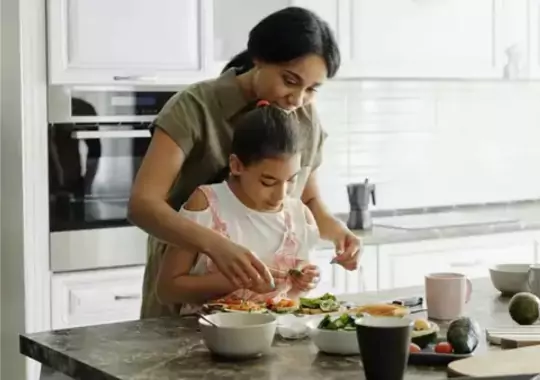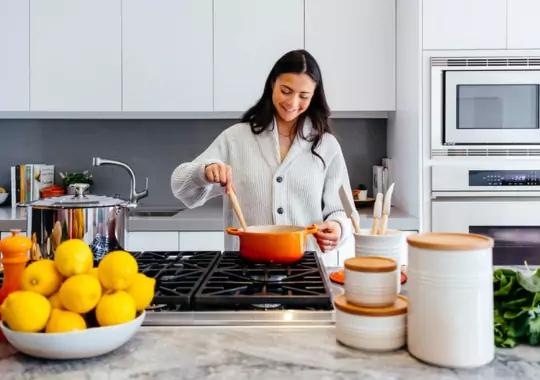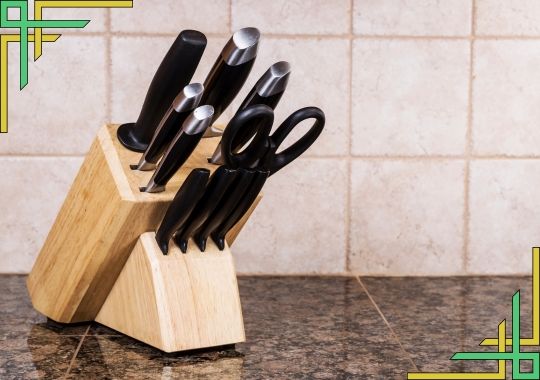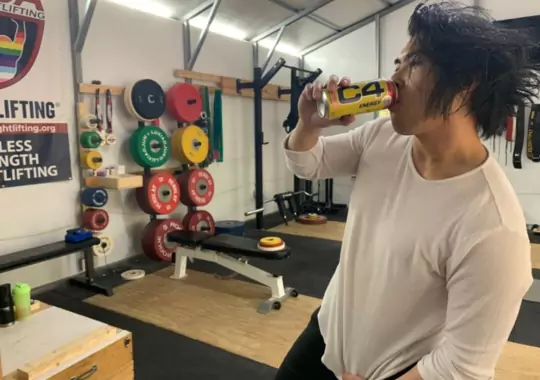The kitchen, a place where delicious meals like hamburgers, spaghetti, and creme brulee are crafted, can turn into a hazardous environment in inexperienced hands. The narrative introduces Scott and Claire, seemingly harmless student cooks who, if not following safe practices, could be potential dangers in the kitchen. Understanding and implementing proper kitchen safety measures.
As Amazon affiliates we may earn a commission if you purchase a product at no cost to you.
Clothing and Footwear
In the kitchen, safety starts with what you wear. Loose clothing, like baggy sleeves or hoodies, can easily catch fire if they come into contact with a flame or hot surface. It's essential to wear well-fitting clothes that won't dangle or get caught in machinery. Additionally, sturdy, closed-toe shoes are a must to protect your feet from spills, dropped utensils, or hot liquids.
When preparing food, always tie back long hair and remove any jewelry to prevent accidents and food contamination. Long hair can easily fall into food or catch fire, while jewelry can harbor bacteria and get caught in equipment. By dressing appropriately, you not only protect yourself from potential hazards but also ensure a more hygienic food preparation environment.
Knife Safety
Proper knife handling is crucial in the kitchen to prevent accidents. Always use the right knife for the task at hand, ensuring it is sharp and in good condition. Dull knives are more likely to slip and cause injuries. When passing a knife, do so by the handle, not the blade, and never leave knives in sinks or soapy water where they can't be seen.
Avoid playing pranks with knives or using them for anything other than their intended purpose. Always cut away from your body and keep your fingers clear of the blade. When not in use, store knives in a knife block or on a magnetic strip to keep them safely out of reach. Proper knife safety not only protects you but also ensures that your kitchen remains a safe and efficient workspace.

Fire Safety
In the kitchen, fire safety is paramount. Keep the cooking area clean and free of grease buildup, which can ignite and cause fires. Practice proper food handling to prevent spills and flare-ups.
In the event of a fire, never use water on a grease fire, as it can cause the flames to spread. Instead, smother the fire by covering it with a lid or using a fire extinguisher.
Maintain a safe environment by keeping flammable items away from heat sources and ensuring that all appliances are in good working condition. By following these fire safety tips, you can prevent accidents and keep your kitchen safe.
Electrical Safety
In the kitchen, electrical safety is crucial. Avoid using electrical appliances with wet hands or in wet conditions to prevent electric shocks. Inspect cords and equipment for any signs of damage or wear, and replace them immediately if necessary.
When plugging in or unplugging appliances, always grip the plug, not the cord, to avoid damage. Additionally, use appliances according to their intended purpose and avoid overloading electrical outlets.
By practicing electrical safety in the kitchen, you can reduce the risk of accidents and ensure a safe cooking environment.

Hygiene Practices
Maintaining proper hygiene practices in the kitchen is essential for preventing accidents and ensuring food safety. Wash hands thoroughly with soap and water before and after handling food, especially after using the restroom or touching your face or hair.
Use separate cutting boards for raw meat, poultry, and vegetables to avoid cross-contamination. Clean and sanitize countertops, utensils, and surfaces regularly, especially after handling raw meat or eggs.
Store food properly in the refrigerator or pantry to prevent spoilage and contamination. Regularly check the expiration dates of food items and discard any that are expired.
By following these hygiene practices, you can create a safe and clean environment in your kitchen, ensuring that your meals are not only delicious but also safe to eat.
Recommended Article

Frequently Asked Questions FAQs
Why is kitchen safety important?
Kitchen safety is essential to prevent accidents, injuries, and fires. By following safety guidelines, you can protect yourself and others from burns, cuts, and other mishaps that can occur while cooking.
What are some basic kitchen safety tips?
Basic kitchen safety tips include wearing appropriate clothing and footwear, washing hands thoroughly, using sharp knives with caution, and keeping the kitchen clean and organized. It's also important to be mindful of fire and electrical hazards.
How can I prevent accidents in the kitchen?
To prevent accidents in the kitchen, always pay attention to what you're doing, use equipment properly, and keep the kitchen clean and free of clutter. Avoid distractions while cooking and never leave cooking food unattended.
Conclusion
Prioritizing safety in the kitchen is crucial for enjoying the cooking process and ensuring the well-being of everyone involved. Individuals can minimize the risk of accidents and create a safer environment for themselves and others. Whether you're a seasoned chef or just starting out, practicing good kitchen safety habits is essential for a pleasant and accident-free cooking experience.










